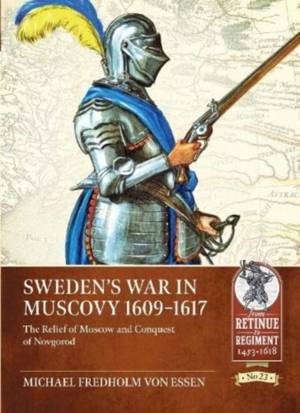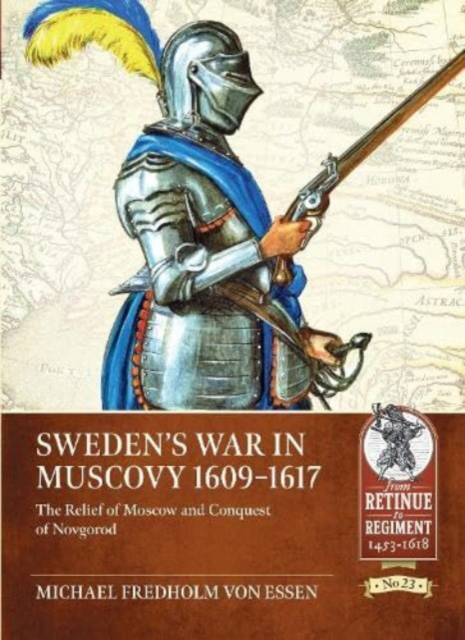
- Retrait gratuit dans votre magasin Club
- 7.000.000 titres dans notre catalogue
- Payer en toute sécurité
- Toujours un magasin près de chez vous
- Retrait gratuit dans votre magasin Club
- 7.000.0000 titres dans notre catalogue
- Payer en toute sécurité
- Toujours un magasin près de chez vous
Sweden's War in Muscovy 1609-1617
The Relief of Moscow and Conquest of Novgorod
Michael Fredholm Von Essen
48,95 €
+ 97 points
Description
This study describes and analyses the Swedish campaign in Muscovy of 1609-1610 and the Ingrian War of 1610-1617 between Sweden and Muscovy; both wars took place during Russia's 'Time of Troubles'. Faced with a serious threat from the Polish-Lithuanian Commonwealth, Moscow entered into an alliance with Sweden and ultimately offered the crown to the young Gustavus Adolphus of Sweden. Initially, a Swedish expeditionary force, commanded by Jacob De la Gardie, marched to Moscow to save Muscovy from a Polish-Lithuanian army. However, the Swedish and Muscovite armies were defeated in the battle of Klushino. Later, Sweden conquered Novgorod. But while the representatives of Gustavus Adolphus ruled Muscovy from Novgorod, a coup in Moscow led to the assumption of power by the first Tsar of the Romanov dynasty. Sweden accordingly entered into a war against Muscovy - the Ingrian War, in which Gustavus Adolphus laid siege to Pskov.
The war ended in 1617 with the Treaty of Stolbovo, by which Muscovy ceded key territories to Sweden while Sweden recognized the House of Romanov as rulers of Muscovy. For Sweden, the Treaty of Stolbovo has been described as the most successful peace ever negotiated with Muscovy, or with Russia. For Muscovy, the Treaty marked the ascension of the House of Romanov. In both countries, the war led to significant military reforms that, in time, would make both the Swedish and the Muscovite military establishments forces to be reckoned with. For Gustavus Adolphus, who arrived in 1614 to personally take command of the Swedish war effort, the war in Muscovy proved a significant step on his path to becoming a successful commander during the subsequent Thirty Years' War. In this study Michael Fredholm von Essen presents new research on two wars rarely described in English language works. Additionally, the book details the military systems of both Sweden and Muscovy, with notes about the Commonwealth expeditionary armies, and explains the development of the Swedish Army in the period prior to the Thirty Years' War, in which Gustavus Adolphus was to use it with great success.
The war ended in 1617 with the Treaty of Stolbovo, by which Muscovy ceded key territories to Sweden while Sweden recognized the House of Romanov as rulers of Muscovy. For Sweden, the Treaty of Stolbovo has been described as the most successful peace ever negotiated with Muscovy, or with Russia. For Muscovy, the Treaty marked the ascension of the House of Romanov. In both countries, the war led to significant military reforms that, in time, would make both the Swedish and the Muscovite military establishments forces to be reckoned with. For Gustavus Adolphus, who arrived in 1614 to personally take command of the Swedish war effort, the war in Muscovy proved a significant step on his path to becoming a successful commander during the subsequent Thirty Years' War. In this study Michael Fredholm von Essen presents new research on two wars rarely described in English language works. Additionally, the book details the military systems of both Sweden and Muscovy, with notes about the Commonwealth expeditionary armies, and explains the development of the Swedish Army in the period prior to the Thirty Years' War, in which Gustavus Adolphus was to use it with great success.
Spécifications
Parties prenantes
- Auteur(s) :
- Editeur:
Contenu
- Nombre de pages :
- 392
- Langue:
- Anglais
- Collection :
Caractéristiques
- EAN:
- 9781804510087
- Date de parution :
- 29-02-24
- Format:
- Livre broché
- Format numérique:
- Trade paperback (VS)
- Dimensions :
- 180 mm x 246 mm
- Poids :
- 975 g

Les avis
Nous publions uniquement les avis qui respectent les conditions requises. Consultez nos conditions pour les avis.






